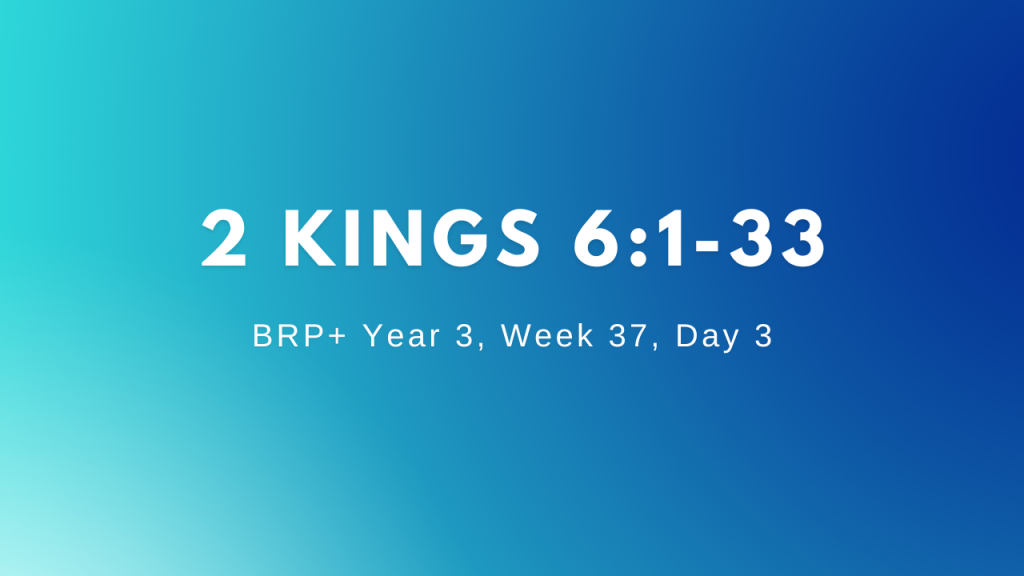2 Kings 6:1-33
Q.1. Why was the school of the prophets relocating? What mishap occurred? How was the problem solved?
We first read about the sons of the prophets in the prophet Samuel’s time (1 Sam.19:18-24). Elijah also had ‘schools’ for at least fifty prophets at Bethel, Jericho, and Jordan (2 Kgs.2:1-7). Elisha, like his mentor Elijah, also had a school for prophets (2 Kgs.4:1, 38-44). They were likely to have been recruited from the family of the Levites. The reason for the relocation was the popularity and growth of the school and the young men took the initiative to find a more spacious and suitable location (2 Kgs.6:1-2). The terrain around the Jordan River would have been ideal and Elisha supported their vision for a new school (2 Kgs.6:3-4). However, there was a mishap that soured the move when a borrowed axe head fell into some deep water (2 Kgs.6:5). Elisha was shown where the axe head had disappeared and was able to miraculously make the iron float so it could be retrieved and returned to its owner (2 Kgs.6:6-7). Multiplying workers for the harvest was always fundamental to achieving God’s plans (Mt.4:18-22; 9:9, 35-38; 28:19-20).
Q.2. What did Elisha see that was not obvious to his servant and the king of Israel? How does such a grasp of the spiritual realm give us peace? – (2 Kgs.6:8-23)
This is another wonderful insight like Job chapters 1 & 2 that reveals the unseen realities that undergird our faith (c.f. 2 Cor.10:3-5; Eph.3:10; 6:12). Both the king of Israel and Elisha’s servant benefitted from the prophet’s spiritual vision and revelation after he prayed – O Lord I pray, open his eyes that he may see. And the Lord opened the servant’s eyes and he saw; and behold, the mountain was full of horses and chariots of fire all around Elisha (2 Kgs.6:17). But when Elisha brought the army into their clutches by striking them with blindness, the king wanted to take advantage of the miracle (2 Kgs.6:21). Fortunately, he listened to Elisha’s advice and treated the enemy with kindness – and the marauding bands of Arameans did not come again into the land of Israel (2 Kgs.6:23). Elisha’s servant had earlier responded with panic when he saw the enemy surrounding their house in the city of Dothan. But he only saw the earthly plight whereas the prophet saw the spiritual dimension – … “Do not fear, for those who are with us are more than those who are with them (2 Kgs.6:16). With spiritual eyes Elisha’s servant realized that it was actually the enemy that was surrounded. The spiritual journey leads us through experiences that confirm to us that – greater is He that is in you than he that is in the world (1 Jn. 4:4).
Q.3. Why do people turn against the servants of God during times of calamity? How can this truth protect us during times of trial? – (2 Kgs.6:24-33)
This story should be part of the incidents recorded in chapter 7 that report the aftermath of the siege against the city of Samaria. King Jehoram could have turned against the prophet for a number of reasons: (i) He had been counselled by the prophet to spare the Arameans – now they had surrounded the city (2 Kgs.6:22); (ii) He had responded to the prophet’s challenge to humble himself before God – all to no avail (2 Kgs.6:30); (iii) But it is likely that he saw the siege as God’s judgment and so he turned against His representative (2 Kgs.6:31). It seems the elders of Israel respected Elisha and accepted the siege as a deserved punishment from the Lord. Consequently, they prevented the king from killing the prophet (2 Kgs.6:32-33).

